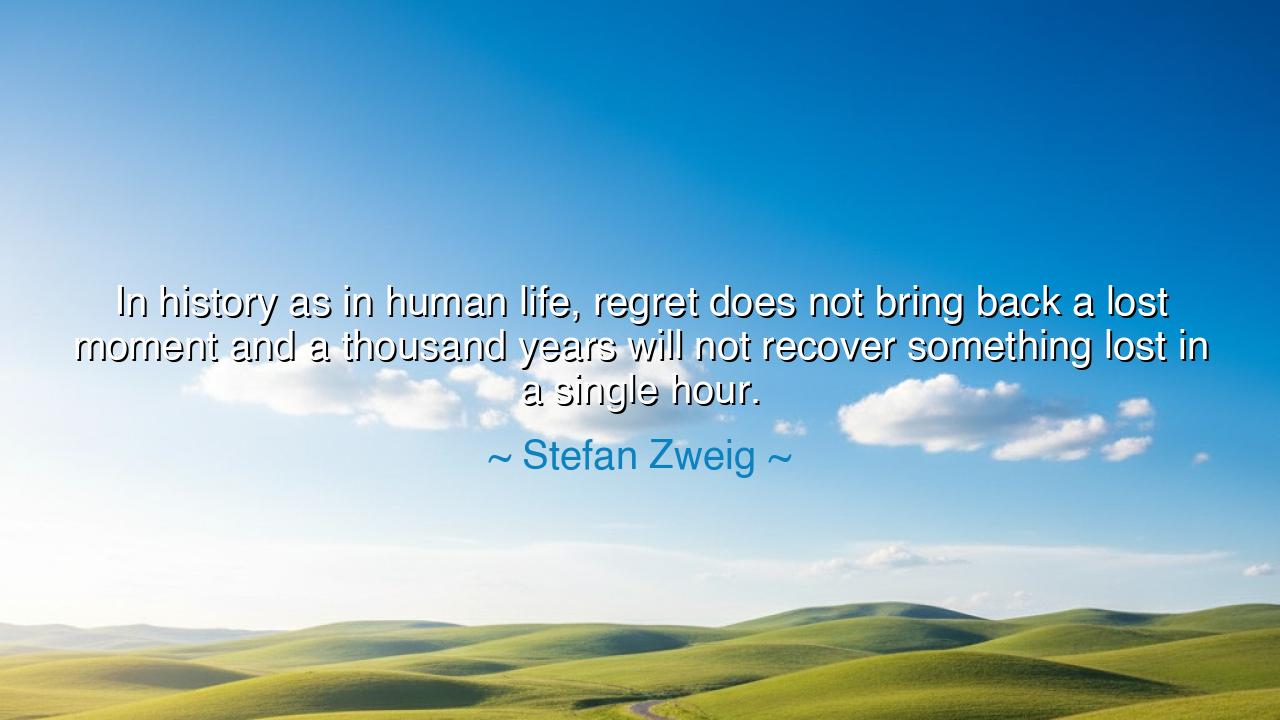
In history as in human life, regret does not bring back a lost
In history as in human life, regret does not bring back a lost moment and a thousand years will not recover something lost in a single hour.






“In history as in human life, regret does not bring back a lost moment and a thousand years will not recover something lost in a single hour.” — Stefan Zweig
Hear, O seekers of wisdom and keepers of memory, the words of Stefan Zweig, the historian of hearts and chronicler of destiny. In this lament, he speaks of regret, that shadow which trails every soul and every civilization. He reminds us that both in the brief life of man and in the long life of nations, time once lost is lost forever. The moment, once passed, is beyond the reach of kings and empires; the hour wasted or misused cannot be redeemed by centuries. Zweig, who saw the collapse of his own world — the graceful old Europe of art and intellect — understood this truth not as a philosopher in peace, but as a witness to ruin.
The origin of these words lies in the ashes of the twentieth century, an age that promised enlightenment yet delivered war. Zweig, an Austrian writer of exquisite sensitivity, lived through the fall of empires, the rise of tyranny, and the destruction of a civilization that had once believed itself eternal. He saw Vienna, that jewel of culture and conversation, shattered by the madness of nationalism. He saw Europe, the continent of Goethe and Mozart, descend into barbarism. Thus his words carry the sorrow of one who beheld history itself committing the same folly that men commit in their own lives — wasting the moment, and repenting too late.
When Zweig writes that “a thousand years will not recover something lost in a single hour,” he speaks to the fragility of both human action and historical choice. There are moments — brief as a breath — in which destiny turns. A word spoken in anger, a treaty signed in pride, a decision delayed by fear — these can alter the course of centuries. Think of the fall of Constantinople, when a single opened gate allowed the city that had stood for a thousand years to fall in a night. Think of the burning of the Library of Alexandria, when the accumulated wisdom of ages vanished in flames that burned for days but echoed through millennia. In both, the loss of an hour became the loss of a civilization’s soul.
And yet, Zweig’s words are not only about nations, but about the heart of man. Each life, too, is a fragile empire of choices. A love left unspoken, a dream postponed, a truth ignored — these are the lost moments that no lifetime can reclaim. Regret may weep at their graves, but it cannot raise them. Like history, the heart moves forward, but it carries the scars of what was missed. Thus, Zweig calls us not to despair, but to awareness — to live and act in the present, before it turns into the silence of the past. For though regret teaches, it teaches always too late.
Consider the example of Napoleon, who stood at the gates of Moscow and hesitated, his pride clouding his reason. That single decision — to linger amid the ruins rather than retreat — destroyed his army and with it the empire he had built. In that fatal delay, he lost not just a battle but a future. Or think of Queen Marie Antoinette, whom Zweig himself wrote of with compassion. Her pride and blindness in the early days of the French Revolution cost her not only her crown but her life. A single hour of humility might have saved a thousand lives. But history, like time, has no mercy for hesitation.
Zweig’s wisdom, therefore, is both tragic and instructive. He teaches that the moments which define us — as individuals or as civilizations — come without warning, and they come only once. When they pass, even eternity cannot restore them. His words are a warning against complacency, a call to vigilance of the heart. For though we cannot command time, we can choose how we spend it; and though we cannot undo what is lost, we can live so fully that regret finds no home within us.
So let this be your lesson, O listeners: seize the living hour. When the choice stands before you — to act or to delay, to speak or to remain silent, to forgive or to turn away — remember that time is not patient, and opportunity does not return. In life as in history, it is not the passage of years that shapes destiny, but the use of moments. Do not wait until the world or your own heart stands in ruin to learn what Zweig knew: that regret is the ghost of lost time, and only those who live with purpose and courage can escape its haunting. Live, then, not as one who hopes for more time, but as one who knows that this hour — this very moment — may be the one upon which eternity turns.






AAdministratorAdministrator
Welcome, honored guests. Please leave a comment, we will respond soon